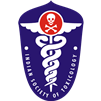Acute Datura Poisoning: Clinico-Toxicological Analysis & Correlation in Poison Detection Center as an aid in Evidence Based Medicine
Keywords:
datura; tropane alkaloids; scopolamine; atropine; hallucinogens; poison detection center; evidence-based medicineAbstract
This work was aimed at mounting and validating thin layer chromatography, and ultraviolet-visible spectrophotometer analysis for identification of toxic substances ingested and at employing this method for analysis of gastric wash sample, urine samples and blood sample in a patient who had consumed datura, as part of evidence-based medicine where blood sample taken 12 hours after datura ingestion was analyzed with chromatography and mass spectrometry that was found to be positive for atropine. The atropine excreted in urine was serially determined by using thin layer chromatography in three subsequent urine samples at an interval of 3hours. The method showed good intra-day and inter-day precisions for analyte. Minimal matrix effects were observed during the thin layer chromatography. Results for forensic case samples demonstrated that the method successfully detected datura active principles in the lethal concentrations. Biochemical markers are extremely helpful in the diagnosis of a patient's illness when they are properly correlated with the clinical signs and symptoms. It also marks an important fact in the current practice of evidence-based medicine. In this incidence we want to discuss the importance of Poison Detection Center in tertiary health care center and the toxicity due to tropane alkaloids with due stress on its biologic and forensic aspects in relation to the clinicotoxicological analysis.



